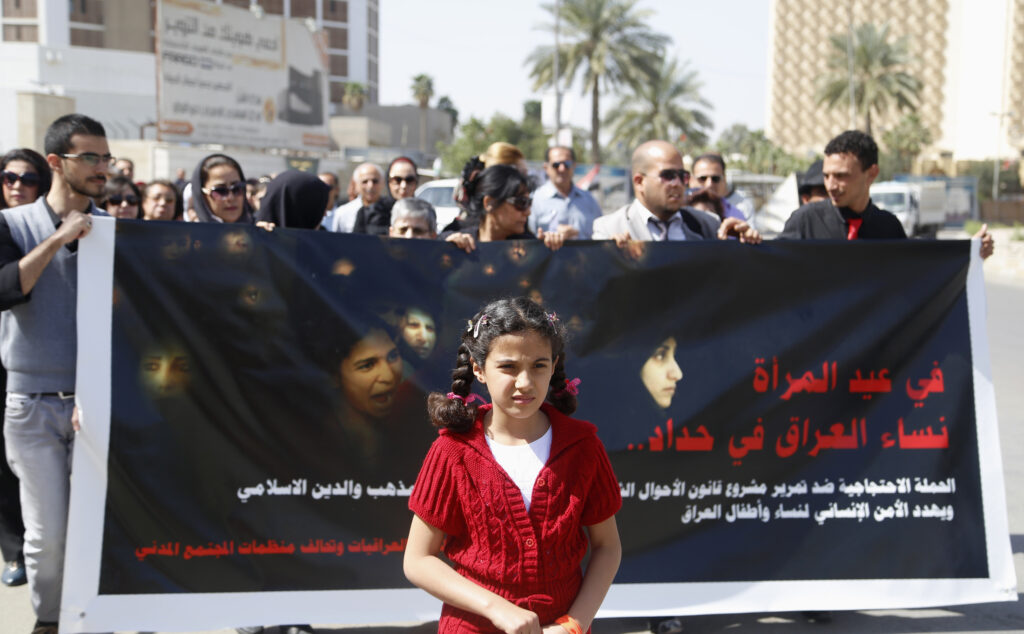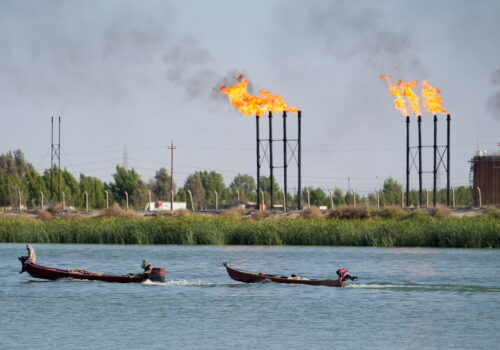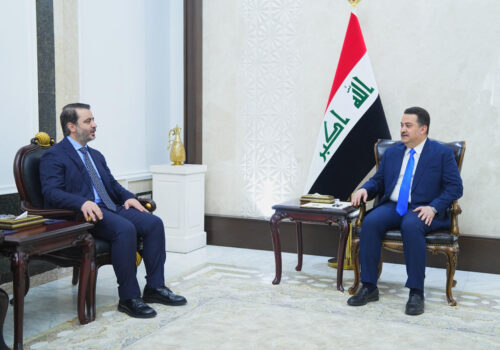The first quarter of 2025 saw widespread concern that the Iraqi government was, through its amendments to the 1959 Personal Status Law, legalizing child marriage and eroding human rights protections of women and girls.
Child marriage, and specifically the marriage of young girls to adult men, remains a long-standing problem in many parts of Iraq, even when forbidden under law. Tribal and religious leaders perform marriages outside the formal legal system, making it difficult for authorities to monitor or prevent child marriages. In areas stricken with poverty, conflict, and displacement, families are pushed to marry off their daughters as a means of economic survival or protection.
The original proposed text of the new amendments permitted the marriage of girls from the age of nine in certain circumstances, depending on religious interpretations, and granted religious authorities increased power over family matters, including marriage, divorce, and child custody. Proponents of those amendments, primarily conservative Shiite lawmakers, defended the changes as better aligning the law with Islamic principles and reducing Western influence on Iraqi culture.
Iraqi women’s rights activists protested that the amendments effectively “legalise child rape”, and constitute a dramatic rollback in the rights and protections previously guaranteed to women and children under Iraqi law. Their advocacy and pressure appear to have limited the amendments’ harm by retaining provisions for the minimum age of marriage, child custody, and polygamy.
Under the final text of amendments, which entered into force in February, Muslim couples concluding a marriage contract must elect whether the contract—which specifies right and obligations as regards marriage, divorce, child custody, and inheritance—is to be governed under the 1959 Personal Status Law or a Personal Status Code (mudawana), the latter to be developed by the Shia Ja’afari school of Islamic jurisprudence. For marriage contracts concluded and registered before the law’s effective date, either party may submit a request to the Personal Status Court to apply rulings of the Jaafari Shiite school of jurisprudence. If parties in a family dispute disagree on whether to apply the rulings of the Shiite Jaafari school in cases of divorce, the court will apply the choice of the husband.
The amendments also stipulate that the Shiite Endowment Scientific Council, with the assistance of judges and legal experts and in coordination with the State Council, shall develop a code of personal status based on the Jaafari Shiite school of jurisprudence, and submit it to the parliament within four months of the code’s effective date. This code must comply with existing provisions, including those of the 1959 Law, which sets the minimum age of marriage, with exceptions allowing marriage from the age of 15 with a judge’s permission and depending on the child’s “maturity and physical capacity.”
SIGN UP FOR THIS WEEK IN THE MIDEAST NEWSLETTER
The Iraqi government issued a statement indicating that the amendments came at the request of the citizens represented by the Shiite component in the parliament. Baghdad also clarified that, under the new law, the rulings of the Shiite Jaafari school of jurisprudence apply exclusively to Shiite Iraqis and do not apply to the Sunni Muslims in Iraq.
While there have been some elements of relief that the Iraq parliament has pulled back from legalizing child marriage, the situation remains dynamic, with ongoing discussions concerning the implications of the amendments and the development of the new personal status code, applicable only to the Shia community.
Without enforcement of the law, the Iraqi government is continuing to fail in its duty to protect the rights of its most vulnerable citizens. Girl brides often have little power within their marriages and are less likely to complete their education or be employed, undermining their opportunities for personal and financial autonomy. If divorced or abandoned by their husbands, they have little to equip themselves with to escape cycles of poverty.
Many so-called early marriages constitute de facto forced marriages. Forced marriage is a violation in itself and is also the site of numerous other abuses, including sustained sexual and physical violence. For young girls, pregnancy and childbirth may come with numerous health consequences. According to the World Health Organization, pregnancy and childbirth complications are a leading cause of death among adolescent girls worldwide. Boys who are subjected to early and/or forced marriages are also harmed. Forced to become breadwinners in adolescence, boys suffer curtailed education and career prospects.
The attempts to roll back the rights of women and girls, and the Government’s empowerment of religious authorities to govern people’s personal affairs, underscore the urgent need to support Iraqi human rights activists, and women and children’s rights activists in particular. With Iraq receding from the international headlines and as US humanitarian aid cuts increase the fragility of human rights work, there is a danger that Iraq’s most vulnerable are being left behind.
Sareta Ashraph is a senior legal advisor for the Strategic Litigation Project at the Atlantic Council.
Further reading
Thu, Apr 3, 2025
Experts React: No MENA ally or adversary unscathed by Trump tariffs
MENASource By
A “Liberation Day” for the White House, an upset for global markets. President Donald Trump on Wednesday made good on a campaign promise, slapping tariffs spanning between 10 percent and 50 percent on countries across the globe. Almost no ally or adversary has been left unscathed in the sweeping move, and the Middle East and […]
Thu, Apr 3, 2025
Washington halted the Iraq-Iran electricity waiver. Here is how it’s perceived by Washington and Baghdad.
MENASource By Ahmed Tabaqchali, C. Anthony Pfaff
By making Iranian energy more costly, the United States hopes to incentivize Iraq to diversify its energy sources and reduce its dependency on Iran.
Wed, Mar 19, 2025
Why the United States must bridge the Iraq-Syria divide
MENASource By Sarkawt Shamsulddin
With leverage over both capitals, the United States emerges as the linchpin in delicate diplomatic moment between Baghdad and Damascus.
Image: Protesters take part in a demonstration against the draft of the "Al-Jafaari" Personal Status Law during International Women's Day in Baghdad, March 8, 2014. About two dozen Iraqi women demonstrated on Saturday in Baghdad against a draft law approved by the Iraqi cabinet that would permit the marriage of nine-year-old girls and automatically give child custody to fathers. The sign reads, "Women are not for sale or purchase". Picture taken March 8, 2014. REUTERS/Thaier al-Sudani (IRAQ - Tags: SOCIETY ANNIVERSARY POLITICS CIVIL UNREST)



